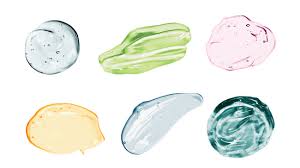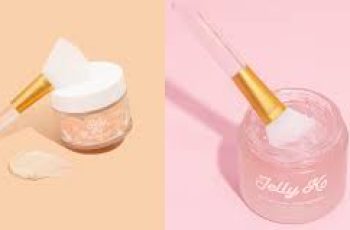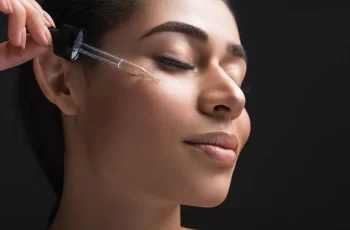
Antiaging Ingredients in Skincare: Dictionary and List
There are many scientifically proven antiaging ingredients, but choosing an antiaging cream or serum can be challenging because there are so many anti-wrinkle and skin firming ingredients. How do you know which are best for your skin type?
For antiaging ingredients to really work, you need to choose the best ones for you and use them in the correct step of your skin care routine.
At the end of this blog is a list of the different types of antiaging ingredients. You can search by categories or by the ingredient name. Click on the ingredient for detailed information and research on the cosmeceutical ingredient.
Which antiaging ingredient is best for you depends upon your Baumann Skin Type®.
Exosomes, retinol, vitamin C, and sunscreen are the best antiaging ingredients with the most research.
Some antiaging ingredients are better than others at treating and preventing wrinkles.
The best antiaging ingredients for you will depend on with of the 16 skin types you are. Take the quiz for personalized antiaging skincare advice.
Scientifically-Proven Antiaging Ingredients
Anti-aging skincare is getting very interesting as new scientific discoveries about cellular senescence and other causes of aging are being discovered. We now have scientifically-proven antiaging ingredients for the skin that really work such as retinoids, Vitamin C, and some types of exosomes.
Many cosmetic ingredients are natural antiaging ingredients: some derived from plants while others are made from human tissue.
The best wrinkle creams have good research to support their use, but if you are not a dermatologist, it is hard to know the difference between pseudoscience and what really works. Skin care brands love to use pseudoscience to convince you that the antiaging ingredients in their skin care products are the best.
My goal is to empower you with the facts about antiaging serums and creams so you can recognize pseudoscience from real evidence-based research data and make better choices about which antiaging products to buy.
What is pseudoscience?
Pseudoscience is a term used to describe beliefs or practices that claim to be scientific but lack evidence or methods typically associated with real science. While science follows a strict process to test and prove theories, pseudoscience often relies on personal anecdotes, untested ideas, or biased data. An easy way to think about it: pseudoscience looks or sounds like science but doesn’t follow the same strict rules or standards.
What are the best antiaging ingredients
Best Antiaging Ingredients
There are good ingredients like retinoids and ascorbic acid to help increase the production of collagen which aging skin types need. These ingredients smooth fine lines, make skin stronger, and give long lasting results. Hyaluronic acid and heparan sulfate can plump up skin with their humectant abilities, but this improvement is temporary. These types of ingredients can be combined and used together in a skin care routine.
Ingredients that claim to increase elastin, firm skin, or improve sagging are sketchy. There is no way to increase skin elastin! (1,3) Any firming benefits are due to the ingredients making a firm coating on the skin (like fondant on a cake). The skin firming benefits of peptides and saccharides are temporary.
4 Best Antiaging Ingredients with the Most Research:
Exosomes
Retinol
Sunscreen
Vitamin C
Common antiaging ingredients
Most Common Antiaging Ingredients in Skin Care
The most popular anti-aging ingredients are not necessarily the best. You see, some ingredients have an immediate smoothing and firming effect that makes you look younger immediately. But these effects are temporary. Dermatologist-approved antiaging ingredients have more long term effects but you need to wait to see the benefits.
So do not trade off preventing future wrinkles with a temporary quick fix. Know which ingredients give temporary results and which are long term.
In the custom skin care routine that I will give you after you take the quiz, I choose the best antiaging ingredients for your skin type and I try to include ingredients with both long and short term benefits. Depending on your skin type, I also try to include ingredients that treat wrinkles you already have and prevent future wrinkles.
The best age to begin antiaging ingredients depends on which Baumann Skin Type you have.
Which ingredients get the most buzz on social media and Tik Tok? This top 10 list has all the trending antiwrinkle ingredients.
The Top 10 antiaging ingredients are:
Growth Factors
Hyaluronic Acid
Peptides
Retinoids
Vitamin C
Green tea
Resveratrol
Heparan Sulfate
Argiriline
Tri Hex Technology
These are the 10 most popular ingredients used for wrinkles and skin firming, but they may not be the best antiaging ingredients for you. Click on each ingredient name to see the benefits, if they are safe, and if they are worth the cost.
These are the best-selling antiaging ingredients but they may not be the best for skin repair. For skin care ingredients to really work, they need to target any skin problems you have that are making your skin look old or age fast.
Remember – best selling does not mean they are the most effective! Do your research!
If you would like to hear me interview cosmetic scientists from the best antiaging skin care brands talk about the science behind the antiwrinkle agents in their products, check out the Product Talks playlist on the Skin Type Solutions YouTube Channel.
when to start an anti-aging regimen?
Ingredients to Erase Wrinkles and Prevent Wrinkles
Starting early and preventing wrinkles is always better than trying to remove wrinkles. Learn what causes skin aging and what age should you begin antiaging skincare?
There are so many different types of antiaging ingredients and many of the antiaging skin care products are very expensive. You do not want to waste time and money and maybe cause damage to your skin by using the wrong ones, or using them incorrectly, or using them with other products that inactivate them or increase the side effects.
Don’t worry. We will help you make better skincare routine choices and find the best antiaging ingredients for your Baumann Skin Type.
Take the Quiz
The five very best and most effective antiaging ingredients to treat wrinkles are:
Ascorbic Acid (Vitamin C)
Cellular senescence decreasing ingredients
Exosomes
Hydroxy acids
Retinoids
The eight most effective antiaging ingredient categories to prevent wrinkles are ingredients that:
Decrease inflammation and redness
Decrease numbers of senescent cells
Improve cell to cell communication
Increase autophagy
Neutralize free radicals
Protect the skin from sun
Repair DNA Damage
Stimulate the retinoid receptors
Natural Antiaging Ingredients
There are many natural ingredients that have antiaging properties because many plants have antioxidant ingredients such as polyphenols. Plant-derived natural ingredients usually meet clean beauty standard requirements and are popular in vegan antiaging products.
Antiaging oils
Natural Antiaging Oils
Many oils have antioxidants that are believed to prevent aging. Here are some examples of a natural antiaging oils you can use on your skin:
Almond oil: A good source of vitamin E, providing antioxidant benefits.
Apricot oil: High in vitamins A and E, offering skin-nourishing antioxidant properties.
Argan oil: Contains vitamin E, coenzyme Q10, and other antioxidant compounds.
Avocado oil: Rich in vitamin E and other antioxidants.
Borage seed oil: Contains gamma-linolenic acid (GLA) and other antioxidants.
Coconut oil: Has vitamin E and certain phenolic compounds.
Essential oils: A wide range of oils, many have antioxidant properties.
Grapeseed oil: High in vitamin E and flavonoids.
Jojoba oil: Though technically a wax ester, it has antioxidant properties similar to our skin’s natural sebum.
Macadamia nut oil: Contains squalene and vitamin E, providing antioxidant benefits.
Olive oil: Contains vitamin E and phenolic compounds.
Pomegranate seed oil: Contains powerful antioxidants like punicalagins and anthocyanins.
Rice bran oil: High in vitamin E and oryzanol.
Rosehip oil: Packed with vitamins A, C, and E.
Safflower oil: Known for its vitamin E content, which acts as an antioxidant.
Sea buckthorn oil: Has a variety of antioxidants including vitamin E and carotenoids.
Sesame oil: Contains sesamol and sesaminol, two powerful antioxidants.
Tamanu oil: Contains calophyllic acid and other unique antioxidants.
Vitamin E oil: a potent antioxidant.
Which antiaging oil is best depends upon your Baumann Skin Type.
Natural anti-aging ingredients
Best Plant-Derived Natural Antiaging Ingredients
Plants have many antiaging compounds in them like polyphenols s they are a great source of safe and clean antiaging ingredients. Here are a few examples:
Aloe Vera: Known for its moisturizing and skin-soothing properties, it can help improve skin elasticity.
Alpha Hydroxy Acids (AHAs): Naturally occurring in fruits and milk, these acids help exfoliate the skin, reducing the appearance of wrinkles.
Bakuchiol: Often referred to as a natural alternative to retinol, it helps improve skin elasticity, firmness, and diminish the appearance of fine lines.
Caffeine: Found in many plants, it can help reduce the appearance of puffiness and dark circles under the eyes.
Feverfew: Contains anti-inflammatory properties, which can help reduce the appearance of skin redness and irritation.
Ginkgo Biloba: Rich in antioxidant properties, it can help protect the skin from environmental stressors.
Green Tea: Packed with polyphenols, particularly epigallocatechin gallate (EGCG), which have strong antioxidant properties to help protect the skin from free radical damage.
Licorice Root: Contains glabridin and liquiritin, which can help brighten skin and reduce the appearance of dark spots.
Niacinamide (Vitamin B3): Derived from plants, it can help reduce the appearance of large pores, even skin tone, and strengthen the skin’s surface.
Resveratrol: Found in grapes and berries, it possesses strong antioxidant properties that can combat signs of aging.
Soy: Contains isoflavones that can help brighten the skin, decrease redness, and improve skin elasticity.
Vitamin C: Derived from various fruits and vegetables, it can help brighten the skin, reduce the appearance of fine lines, and protect against free radical damage.
Insect and reptile derived antiaging ingredients
Insect- and Reptile-Derived Antiaging Ingredients
There are many insect and reptile-derived ingredients used to treat aged skin. These get a lot of social media attention, but many of them do not have a lot of research to back up their use for wrinkles and sagging skin:
Bee Venom: When applied topically, it may stimulate the skin, leading to increased blood circulation and production of natural collagen and elastin. This can help in reducing the appearance of fine lines but can cause extreme skin irritation and we do not recommend it.
Honey: Produced by bees, honey has natural humectant properties, which means it attracts moisture. It’s also rich in antioxidants and can help hydrate the skin, making it appear plumper and more youthful.
Royal Jelly: This substance is secreted by worker bees and fed to the queen bee. It’s rich in proteins, vitamins, and fatty acids, which can boost collagen production and skin renewal.
Silk Proteins: Derived from silkworms, these proteins are often used in skincare products for their moisturizing properties and their ability to form a protective barrier on the skin.
Snake Venom (Syn-Ake): Synthetic snake venom peptides (Syn-Ake) mimic the effects of a peptide that’s found in temple viper venom. This ingredient claims to help reduce muscle movement, leading to fewer wrinkles, but data is not convincing.
Snail Mucus (Snail Secretion Filtrate): Extracted from common garden snails, it’s packed with proteins, hyaluronic acid, and glycolic acid, which can help regenerate the skin, improve its moisture retention, and reduce the appearance of wrinkles. This si an expensive ay to use a humectant. We suggest using glycerin instead.
Spider Venom: Some compounds derived from spider venom are used in skincare products due to their potential muscle-relaxing properties, leading to a reduction in the appearance of wrinkles, similar to the effect of Botox. However, these do not penetratee into the deeper skin layers of the dermis and cannot work like botulinum toxin does.
Find the Best Antiaging Products for My Skin Type
Our team of dermatologists will help you decipher anti-aging skincare claims and understand what really works for YOU.
If you take the quiz, we can help match your skin type to the best antiaging products for your skin type.
Take the Quiz
Click on the anti-aging ingredient category below to learn more about that class of anti-aging ingredients and find out which ingredients work best on your wrinkles and sagging skin.
List of Antiaging Ingredient Categories in Skincare:
Anti-inflammatory ingredients
Antioxidant ingredients
Autophagy increasing ingredients
Cellular senescence decreasing ingredients
Defensins
DNA Repair Enzymes
Exosomes
Glycosaminoglycans
Heparan Sulfate
Hyaluronic Acid
Growth Factors
Peptides
Pollution protection and anti-pollution ingredients
Polyphenols
Retinoids
Sunscreens


